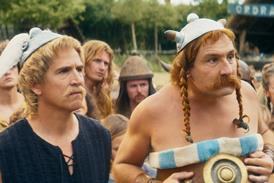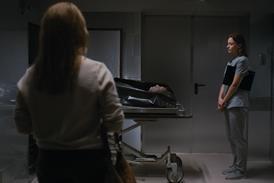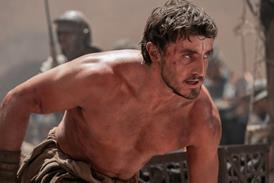Dir: Rabah Ameur-Zaimeche.Fr-Alg. 2005. 98mins.
Like its orange-hatted hero, the drama keeps switching off, dipping in andout of commitment to characters and story. And while this is undoubtedly partand parcel of the director's semi-improvised approach, it ends up compromisingthe audience's commitment too. Further festival action - it played out of competitionat Cannes - and a small French run appear to be the most it can aspire to.
Readable either as aprequel or a sequel to Wesh Wesh, Back Home focuses on Kamel,a young man who has been deported to his native Algeria after serving time in aFrench prison. Played by the director, he channels Ameur-Zaimeche'sobvious ambivalence to the country of his birth, veering between affection anddisgust, involvement and detachment - at its most extreme when he watches anant carry a piece of straw as his hot-headed cousin Bouzid(Abel Jafri, who played the temple guardian in The Passion Of The Christ) argues over abeer debt.
We see a bull beingslaughtered in graphic detail, and its meat shared out, as part of the annual zerba ceremony; we see the dusty, makeshift streets andhouses of Kamel's remote rural village, which issurrounded by rolling cornfields and distant, forested mountains that seem tooffer some sort of escape from the oppressive clannishness of village life.
Now and again, we pluginto the main dramatic current. Part of this involves the fundamentalist threatto Algeria's secular Islamic society. The alcohol-swilling Bouzidis threatened by a gang of young fundamentalist thugs, and the men of thevillage set up a roadblock in response. But the director seems to lose interestin this thread at some point; or perhaps he is reluctant to push it too far.
The only fully developedstoryline centres on Bouzid's sister Louisa (anintense Meriem Serbah), whoruns away from her husband with her little boy and returns to her village. Sheis a double stain on her family: first because she has deserted her man andsecond because she dresses in a shameful Western fashion - something shecompounds by wanting to be a jazz singer. When her loud and vulgar husbandkidnaps his son, Louisa is beaten up by her brother and, driven to distraction,ends up in Constantine psychiatric hospital after a suicide attempt (thesescenes, involving the hospital's real-life inmates, are some of the mostaffecting in the film).
Flooded in colour, the DVphotography probes the village's dust and dirt, lingers on its metal doors andwindow grates, suggesting both that this place is a prison and that everythingthat happens here is garishly open to view, and to criticism.
But when Kamel, who has a superior half-smirk on his face throughmost of the film, says that he can't take it here anymore and wants to crossthe border into Tunisia, nothing has prepared us for this dramatic crux. Likemuch else in this meandering film, it's just thrown into the mix.
Production companies
Sarrazink
Les Films du Losange
International sales
Les Films du Losange
Producer
Rabah Ameur-Zaimeche
Screenplay
Rabah Ameur-Zaimeche
Louise Thermes
Cinematography
Lionel Sautier
Hakim Si Ahmed
Olivier Smittarello
Editor
Nicolas Bancilhon
Music
Rodolphe Burger
Main cast
Rabah Ameur-Zaimeche
Meriem Serbah
Abel Jafri


















No comments yet